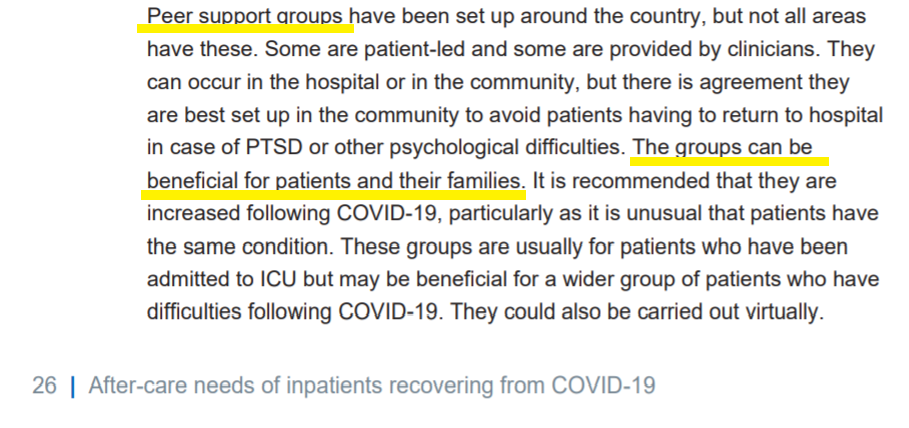You are using an out of date browser. It may not display this or other websites correctly.
You should upgrade or use an alternative browser.
You should upgrade or use an alternative browser.
BMJ Management of post-acute Covid-19 in primary care, 2020, Greenhalgh et al
- Thread starter obeat
- Start date
Kalliope
Senior Member (Voting Rights)
Fatigue
The profound and prolonged nature of fatigue in some post-acute covid-19 patients shares features with chronic fatigue syndrome described after other serious infections including SARS, MERS, and community acquired pneumonia.19202244 We found no published research evidence on the efficacy of either pharmacological or non-pharmacological interventions on fatigue after covid-19. Patient resources on fatigue management45 and guidance for clinicians on return to exercise43 and graded return to performance for athletes (box 4) 46 in covid-19 are currently all based on indirect evidence.
The profound and prolonged nature of fatigue in some post-acute covid-19 patients shares features with chronic fatigue syndrome described after other serious infections including SARS, MERS, and community acquired pneumonia.19202244 We found no published research evidence on the efficacy of either pharmacological or non-pharmacological interventions on fatigue after covid-19. Patient resources on fatigue management45 and guidance for clinicians on return to exercise43 and graded return to performance for athletes (box 4) 46 in covid-19 are currently all based on indirect evidence.
Ravn
Senior Member (Voting Rights)
Patients were involved in reviewing this prior to publication. One of them was Paul Garner - I don't recognise any of the other names - he may well be reponsible for the bolding of "if tolerated".I like that they recommend pacing and emphasise that graded increase of exercise should be done only if tolerated. Also nice to see recommendations of patient peer support groups.
That is a critical qualifier. It makes it symptom driven, which is pacing not GET.Self pacing and gradual increase in exercise if tolerated.
NelliePledge
Senior Member (Voting Rights)
Agreed but it’s not a bad start and hopefully they could be persuaded to revise it with information about PEM as patients begin to register that the time frame for any anticipated recovery is stretching and get a better understanding of what PEM is and how it affects them in practice.This needed an explanation of PEM.
Without it, there is the risk of symptoms being attributred to deconditioning when they have nothing to do with it.
Arnie Pye
Senior Member (Voting Rights)
This article, intended for primary care clinicians, relates to the patient who has a delayed recovery from an episode of covid-19 that was managed in the community or in a standard hospital ward.
For patients who were not admitted to intensive care, British Thoracic Society guidance on follow-up of covid-19 patients who have had a significant respiratory illness proposes community follow-up with a chest x ray at 12 weeks and referral for new, persistent, or progressive symptoms.26 For those with evidence of lung damage (such as persistent abnormal chest x ray and oximeter readings), referral to a respiratory service is recommended; subsequent early referral to pulmonary rehabilitation probably aids recovery.
I don't understand this. How can someone whose covid-19 was managed in the community have a persistent abnormal chest x-ray if the same article recommends chest x-ray only at 12 weeks?
And "subsequent early referral to pulmonary rehabilitation probably aids recovery"? Obviously my definition of the word "early" is substantially different to that of the author.
Dx Revision Watch
Senior Member (Voting Rights)
Benefits of peer support group membership was also mentioned in the June 2020 document:
https://www.england.nhs.uk/coronavi...needs-of-inpatients-recovering-from-covid-19/
After-care needs of inpatients recovering from COVID-19

But Chalder, Sharpe, Moss-Morris et al promulgate that for ME and CFS patients, membership of peer support groups associated with poor outcome:

https://www.england.nhs.uk/coronavi...needs-of-inpatients-recovering-from-covid-19/
After-care needs of inpatients recovering from COVID-19

But Chalder, Sharpe, Moss-Morris et al promulgate that for ME and CFS patients, membership of peer support groups associated with poor outcome:

Kitty
Senior Member (Voting Rights)
I like that they recommend pacing and emphasise that graded increase of exercise should be done only if tolerated.
I'm really hoping this is the final death knell for GET. I know it's not a NICE publication, but it's from an influential journal; it's quite hard to see how NICE could continue recommending exercise-based 'therapy' in the face of publications like this.
Peter T
Senior Member (Voting Rights)
But Chalder, Sharpe, Moss-Morris et al promulgate that for ME and CFS patients, membership of peer support groups associated with poor outcome:
Though this group have real problems understanding that association is not causality and invariably decide on a direction of causality that suits their own preconceptions regardless of other evidence.
Benefits of peer support group membership was also mentioned in the June 2020 document:
https://www.england.nhs.uk/coronavi...needs-of-inpatients-recovering-from-covid-19/
After-care needs of inpatients recovering from COVID-19

But Chalder, Sharpe, Moss-Morris et al promulgate that for ME and CFS patients, membership of peer support groups associated with poor outcome:

Are there other disease/illness groups where the main clinician/researchers are so negative about peer-support groups and relevant charities?
Dx Revision Watch
Senior Member (Voting Rights)
Are there other disease/illness groups where the main clinician/researchers are so negative about peer-support groups and relevant charities?
Good question.
Their frequent references, in the past, to highly organised and "politicised" patient organisations that operate as "powerful lobby groups" used to amuse me.
Dx Revision Watch
Senior Member (Voting Rights)
Though this group have real problems understanding that association is not causality and invariably decide on a direction of causality that suits their own preconceptions regardless of other evidence.
Indeed.
I am glad they are listening to those who know (patient peer reviewers) what they're talking about!
I am glad they are listening to those who know (patient peer reviewers) what they're talking about!
A shame they needed to but yes.


